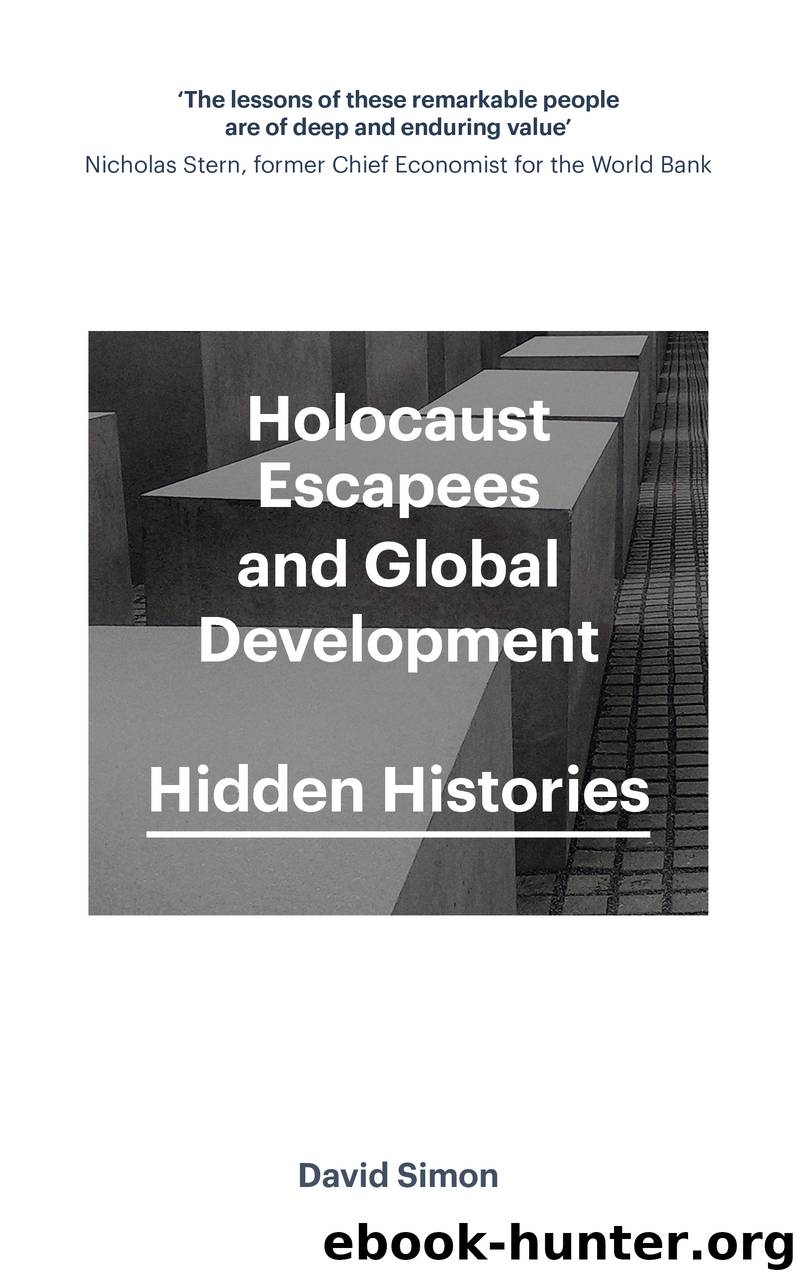Holocaust Escapees and Global Development by David Simon

Author:David Simon
Language: eng
Format: epub
ISBN: 9781786995155
Publisher: Book Network Int'l Limited trading as NBN International (NBNi)
Published: 2018-10-15T16:00:00+00:00
The Activist Academic: Theodor Bergmann
Like Streeten, Theodor Bergmann was able to complete his higher education only after the war, it having been delayed by his flight from Germany and then badly interrupted by his equally precipitate escape from Czechoslovakia after the Anschluss. He enrolled at the University of Bonn, completing his agricultural sciences degree in 1947, before embarking on his PhD at the University of Hohenheim. This drew on his Swedish agricultural experience in addressing changes in Swedish agricultural structure. It was completed in 1955, followed by his Habilitation from 1965 to 1968 on the functions and activity boundaries of production unions in developing countries. All this time, he worked outside the university context, initially as an unskilled metal factory worker, then in the Hannover Chamber of Agricultural Affairs and then leading a project in Turkey.
He was also very active in the labour and communist movements. On returning to Germany, he briefly considered moving to the Soviet Occupation Zone but was dissuaded after illegally crossing into it to meet KPD-O colleagues. He then joined the Gruppe Arbeiterspolitik (Workers’ Politics Group) and edited its newspaper from 1948 until he resigned from the organisation over internal conflicts in 1952. The secretary’s salary of his new wife, Gretel Steinhilber, a fellow party member, kept them afloat while he was unsalaried. They had no children. He later nursed her through a long illness before her death in 1994 (Kessler 2017). Following this loss, he continued his work with increased vigour.
Kessler (ibid.) also records that the Danish economists, Morgens and Ester Boserup, lent political support to Bergmann during the Arbeiterspolitik period. This is a significant connection for purposes of this book, since Ester Boserup worked in India and, along with Heinz Arndt, participated in the landmark Asian Drama project led by Gunnar Myrdal in the 1960s, as explained earlier in this chapter. This connection may well have facilitated Bergmann’s research in India. Whether Bergmann and Arndt met or collaborated is doubtful, both because their politics were by then very different, and because Bergmann is not mentioned in Arndt’s autobiography (Arndt 1985) or biography (Coleman et al. 2007). It is unclear whether Bergmann ever encountered Paul Streeten, an economist just one year his junior and another of Myrdal’s collaborators.
As indicated by the subject of his Habilitation thesis, Bergmann had, during the 1950s and 1960s, expanded the geographical range of his interests beyond Europe, to developing countries and especially those experimenting with different forms of socialist transition. He focused particularly on agricultural and agrarian transformation efforts in China and postcolonial states, especially India. However, he never lost interest in the Israeli kibbutz movement, which comprised many socialist collective experiments, although some later evolved into more individualised models. He returned to that country frequently – partly to visit his extended family – and published regularly on the subject (e.g. Bergmann and Liegle 2002). On all these subjects, he became a leading international authority and regularly undertook consultancies for the UN’s Food and Agriculture Organization (FAO). He published widely on these issues in both German and English (e.
Download
This site does not store any files on its server. We only index and link to content provided by other sites. Please contact the content providers to delete copyright contents if any and email us, we'll remove relevant links or contents immediately.
Spare by Prince Harry The Duke of Sussex(5172)
Navigation and Map Reading by K Andrew(5147)
Tuesdays with Morrie by Mitch Albom(4762)
Machine Learning at Scale with H2O by Gregory Keys | David Whiting(4289)
Cracking the GRE Premium Edition with 6 Practice Tests, 2015 (Graduate School Test Preparation) by Princeton Review(4270)
Never by Ken Follett(3928)
Goodbye Paradise(3795)
What It Really Takes to Get Into Ivy League and Other Highly Selective Colleges by Hughes Chuck(3737)
Fairy Tale by Stephen King(3364)
Harry Potter and the Prisoner of Azkaban (Book 3) by J. K. Rowling(3346)
Pledged by Alexandra Robbins(3167)
Kick Ass in College: Highest Rated "How to Study in College" Book | 77 Ninja Study Skills Tips and Career Strategies | Motivational for College Students: A Guerrilla Guide to College Success by Fox Gunnar(3108)
Reminders of Him: A Novel by Colleen Hoover(3067)
A Dictionary of Sociology by Unknown(3065)
Sapiens and Homo Deus by Yuval Noah Harari(3057)
The Social Psychology of Inequality by Unknown(3013)
Graduate Admissions Essays, Fourth Edition: Write Your Way into the Graduate School of Your Choice (Graduate Admissions Essays: Write Your Way Into the) by Asher Donald(2903)
Will by Will Smith(2898)
Zero to Make by David Lang(2774)
